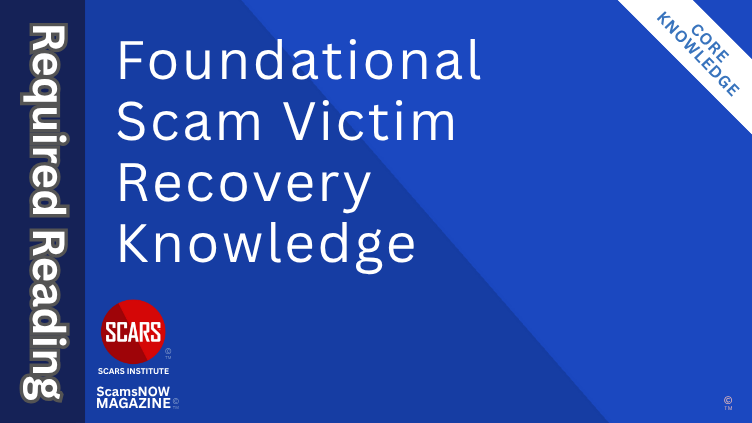The Myth of the “One-Time Lesson”
Why Scam Victims’ Recovery Requires Ongoing Effort and Emotional Vigilance, and Why Scam Recovery Isn’t a Straight Line
Primary Category: Scam Victim Recovery Psychology
Intended Audience: Scam Victims-Survivors / Family & Friends
Authors:
• Vianey Gonzalez B.Sc(Psych) – Licensed Psychologist, Specialty in Crime Victim Trauma Therapy, Neuropsychologist, Certified Deception Professional, Psychology Advisory Panel & Director of the Society of Citizens Against Relationship Scams Inc.
• Tim McGuinness, Ph.D., DFin, MCPO, MAnth – Anthropologist, Scientist, Polymath, Director of the Society of Citizens Against Relationship Scams Inc.
About This Article
Scam recovery is not a single moment of clarity or a one-time lesson that protects you forever—it is an ongoing, nonlinear process that requires emotional commitment, daily honesty, and long-term resilience. Many victims believe that once they understand what happened, they should be “over it,” but true healing doesn’t follow a straight path; it involves revisiting pain with new tools, learning from emotional triggers, and practicing boundaries, self-care, and self-compassion even when it’s inconvenient. Setbacks are not failures—they are information, revealing where healing is still needed.
Avoiding recovery or treating it as optional only prolongs the trauma’s hold, while staying busy with work or family can mask unprocessed pain and quietly damage the very relationships you’re trying to protect. Healing demands truth—not only about what was done to you, but about how seriously you’re willing to engage in the work of healing. You were lied to in the scam; don’t lie to yourself now. Recovery isn’t about never falling—it’s about choosing, again and again, to stand up, stay present, and do the work that leads to real change. That is the strength that sustains true healing.

The Myth of the “One-Time Lesson”: Why Scam Recovery Isn’t a Straight Line
The idea that trauma recovery follows a neat, linear path is appealing. It fits our desire for structure, logic, and closure. Many scam victims believe that once they understand what happened to them—once they accept the betrayal, name the manipulation, and commit to recovery—they will be safe. They expect a steady progression of improvement, a tidy narrative of “before and after.”
But scam recovery rarely unfolds this way. It is not a simple transformation from victim to survivor. It is a winding, unpredictable path with stops, setbacks, returns, and painful repetitions. The notion of a “one-time lesson” is a myth. And believing in that myth can actually hinder your healing.
Understanding the Nonlinear Nature of Trauma Recovery
Trauma, especially relational or betrayal trauma, rewires your brain and body. It doesn’t just affect your thoughts—it affects your nervous system. This means recovery isn’t just about understanding what happened. It’s about retraining your emotional and physiological responses. And that kind of deep work is not a straight line.
You might have a breakthrough one week—a realization that helps you feel empowered—only to be triggered by a memory the next. You might feel strong and clear for months, then find yourself collapsing and doubting your judgment after a conversation or a dream. These regressions are not failures. They are part of the process.
Scam trauma tends to involve betrayal, intimacy, and trust. Those are not easily compartmentalized. They live in your nervous system. And just as you were slowly conditioned into trust by a scammer, you must now slowly recondition yourself into emotional safety.
Why the “One-Time Lesson” Idea Is Harmful
The idea that “once you know better, you won’t be fooled again” is seductive because it gives you a false sense of control. It suggests that knowledge alone is enough to protect you. But emotional healing doesn’t work that way.
You may have learned how scams work. You may be able to explain the red flags. But that doesn’t mean your body and emotions are fully regulated. You may still crave connection. You may still be vulnerable to subtle manipulation. You may still be seeking closure from someone who harmed you. And you may still struggle with shame, even if you understand that the scam wasn’t your fault.
The danger of the “one-time lesson” myth is that it creates shame around normal setbacks. When you have a new trigger or find yourself emotionally spiraling, you might tell yourself, “I should be past this by now.” That self-judgment compounds your pain and discourages you from reaching out for help.
You might also avoid important parts of recovery work—like trauma therapy, structured support programs, or mindfulness practices—because you assume you’ve already learned what you needed to learn. But recovery is not an intellectual achievement. It is a lived, repeated practice of choosing healing every day.
Emotional Vigilance: The Alternative to Fear-Based Recovery
There is a difference between living in fear and living with awareness. Emotional vigilance is not about expecting the worst or avoiding all risk. It’s about checking in with yourself regularly, noticing when your old patterns start to re-emerge, and practicing self-care to stay grounded.
You don’t have to be suspicious of every person who enters your life. But you do need to slow down when something feels too good, too fast. You do need to listen to your intuition when discomfort arises. And you do need to pause when you notice emotional urgency or the desire to rescue someone.
Emotional vigilance means understanding your emotional landscape well enough to detect when something is off. It means having tools ready—breathing techniques, journal prompts, trusted peers, support groups—to help you return to your center.
This is not fear. It is resilience. It is the skill of recovering in real time, rather than being derailed by triggers or old wounds.
How Triggers Can Reopen Old Wounds
One of the reasons recovery isn’t linear is because life keeps happening. You may hear a voice that sounds like your scammer’s. You may receive a message from an unknown number. You may see a movie that depicts a similar betrayal. These triggers can bring up emotions that feel just as raw as they did in the beginning.
That doesn’t mean you’ve failed to heal. It means your brain and body are reminding you that the trauma left a mark. And just like a physical scar, that mark can ache under certain conditions.
When triggers arise, your job is not to avoid them entirely. Your job is to recognize them, name them, and respond to them with care. That’s how you build resilience. That’s how you turn emotional spirals into learning opportunities.
Recovery Is a Spiral, Not a Ladder
Many victims think of recovery as a ladder: each step up means you’re getting better, and slipping down means you’ve failed. But a more accurate metaphor is a spiral. You keep circling the same themes—trust, betrayal, self-worth, safety—but each time you return, you do so with more insight.
You may cry again about the same memory. You may feel angry at yourself again. You may even long for the scammer again. But if you are paying attention, you’ll notice that each return is a little different. You recover faster. You recognize patterns sooner. You feel more compassion for yourself.
That is progress. It is not clean or linear, but it is real.
What Sustained Healing Actually Looks Like
Overview
Sustained healing doesn’t mean you never get triggered. It means you know what to do when you do. It means you don’t abandon yourself. It means you have a toolbox, and you use it.
It looks like:
-
-
- Setting boundaries even when it’s uncomfortable
- Saying no without guilt
- Taking breaks when you feel overwhelmed
- Checking your thinking for cognitive distortions
- Reaching out for support instead of isolating
-
It also looks like:
-
-
- Celebrating small wins
- Enjoying new relationships without losing your center
- Feeling joy without waiting for it to be taken away
- Trusting your own recovery timeline
-
You don’t arrive at a final destination. You evolve. And that evolution includes relapses, resets, and restarts.
In-depth
Sustained healing is not the absence of pain or the disappearance of emotional triggers. It doesn’t mean you will never feel dysregulated or shaken again. Instead, it means you’ve learned how to respond when those moments arrive. You know how to steady yourself. You don’t collapse or abandon your needs. You recognize what’s happening internally, and you reach for the tools that you’ve built over time. That is what healing looks like—not perfection, but practice.
It means you’re willing to set boundaries, even when it makes you uncomfortable. You say no without apology when something compromises your peace. You allow yourself to step back when you’re overwhelmed, knowing that rest is not failure—it’s fuel. You question the thoughts that spiral out of control, challenging cognitive distortions instead of believing everything your fear tells you. And when isolation starts to pull you inward, you recognize the pattern and choose connection. You reach out. You talk. You let someone witness your struggle so it doesn’t consume you in silence.
But healing is also about what you begin to let in again. It’s about celebrating your own small victories—the moments when you chose yourself, even quietly. It’s about forming new relationships and allowing yourself to trust, while staying rooted in your own sense of worth. You learn to enjoy joy when it comes, without bracing for loss. You stop waiting for the other shoe to drop. You understand that peace is not a trap—it’s a sign of nervous system regulation. And most of all, you begin to trust your own timeline. You stop comparing your progress to someone else’s story. You honor the pace that your recovery requires.
There is no finish line in healing. There is no final arrival point where all pain vanishes and clarity becomes permanent. What there is, instead, is evolution. A slow unfolding of self-awareness, agency, and grace. Some days you will relapse into old thoughts. Some days you’ll feel like you’re starting over. That doesn’t mean you’re failing. It means you’re still growing. Recovery is not a single arc—it’s a series of resets and recommitments. And every time you come back to yourself, you reinforce that this is what healing really is: not never falling, but always returning.
Setting boundaries even when it’s uncomfortable
Sustained healing begins with learning to set boundaries that protect your emotional space, even when it feels awkward or difficult. After a scam, especially one involving emotional manipulation, your sense of personal limits may feel unclear or even nonexistent. Healing requires you to re-establish those limits—not from fear, but from self-respect. Saying “no” to people or situations that drain you is not rejection; it is self-preservation. Boundaries do not make you hard or unkind. They help you stay grounded, safe, and emotionally whole.
Saying no without guilt
For many scam victims, the scam was made possible in part because it was difficult to say no. You may have been conditioned to equate saying no with being cold, selfish, or disloyal. Sustained healing means recognizing that guilt does not belong in your recovery vocabulary. You learn that saying no is not a betrayal of kindness—it is an act of courage. When you say no without guilt, you affirm that your time, energy, and well-being are worth protecting. And over time, that affirmation becomes a habit instead of a battle.
Taking breaks when you feel overwhelmed
Emotional overwhelm doesn’t mean you’re failing—it means your nervous system is signaling that you need rest. Recovery teaches you to listen to that signal instead of pushing through it. Taking a break is not quitting; it’s what gives you the capacity to continue. When you feel emotionally overloaded, you allow yourself space to breathe, reset, and recalibrate. Whether it’s stepping away from a triggering conversation or pausing your recovery work for a day, breaks are how you prevent burnout and sustain progress.
Checking your thinking for cognitive distortions
The way you think shapes the way you feel. Scam trauma often leaves behind distorted thinking patterns—beliefs like “I should have known better,” “I can’t trust anyone,” or “I’ll never recover.” Sustained healing involves actively identifying these distortions. You learn to examine your thoughts instead of accepting them as truth. You begin challenging all-or-nothing thinking, catastrophizing, and internalized blame. Recovery means you become your own reality check—asking whether your thoughts reflect truth or trauma. And with practice, your internal voice becomes kinder, more balanced, and more accurate.
Reaching out for support instead of isolating
Healing does not happen in isolation. Scam trauma often leaves victims feeling ashamed, mistrustful, or disconnected, which makes reaching out feel risky. But part of sustained healing is reclaiming your right to be supported. You stop hiding. You begin to let others in—whether through a trusted friend, a therapist, or a peer support group. You realize that asking for help is not a weakness but a lifeline. Every time you reach out, you break the cycle of silence that scammers count on. And every time you are met with understanding, your trust in the world begins to rebuild.
Celebrating small wins
Sustained healing is not about dramatic turning points. It’s about small, consistent progress. You learn to recognize victories in everyday moments: a calm reaction, a clear boundary, a night of uninterrupted sleep. You stop waiting for a perfect recovery and start noticing your growth as it unfolds. These small wins are not trivial—they are evidence of change. And when you take time to celebrate them, you reinforce the belief that healing is happening, even if it’s slower than you’d like.
Enjoying new relationships without losing your center
One of the most empowering signs of recovery is the ability to form new connections without abandoning your identity. After a scam, you may fear intimacy or assume that every relationship will end in betrayal. Sustained healing means you don’t let those fears control you. You engage with others carefully, but with openness. You bring your full self to the table—needs, boundaries, expectations—and you stay rooted in that self, even when you care deeply. Trust doesn’t mean blindness anymore. It means awareness, communication, and mutual respect.
Feeling joy without waiting for it to be taken away
Scam trauma teaches you to fear the good. Joy feels like a setup. When something goes right, you brace for the loss. But sustained healing reintroduces you to the idea that joy can exist on its own—not as a trap, but as a truth. You stop rehearsing for disappointment. You let yourself feel moments of beauty, pleasure, and peace without wondering when they’ll end. This is not denial—it is bravery. It is a refusal to let your past steal your present.
Trusting your own recovery timeline
Perhaps the most important part of sustained healing is letting go of the idea that there’s a “right” pace. Some victims move quickly. Others take months—or years. Sustained healing means you stop measuring your progress against someone else’s. You trust that your path is valid, even when it’s slow, messy, or uncertain. There is no final destination. There is only the next step. And then the next one after that. Your timeline is yours. And honoring it is how you reclaim your autonomy from the scam that tried to take it away.
You don’t arrive at a final destination. You evolve.
The truth of sustained healing is that it’s not a finish line you cross. It’s an ongoing process of becoming. You grow through relapse, not around it. You reset after setbacks. You restart when you feel stuck. The important thing is not how many times you fall—it’s that you keep choosing to get back up. That’s what recovery is. Not perfection. Not immunity. But persistence. And through that persistence, you don’t just recover—you transform.
Why Patience with Yourself Is Essential
Patience is not just a virtue in scam recovery—it is a necessity. Healing from the kind of emotional and psychological betrayal that comes with being scammed is not a task you complete and check off a list. It’s an ongoing process of re-learning how to trust yourself, how to regulate your emotions, and how to feel safe in the world again. Some days, you will wake up feeling steady and focused. You’ll respond to challenges with clarity. You’ll remember your worth. Other days, the shame may creep back in. Doubt may whisper that you’re still broken. A memory may trigger panic, or a small setback may feel like a collapse. This contrast can be disheartening—but it’s not a sign of failure. It’s a sign that you are human.
Patience is what allows you to stay with yourself through the highs and lows of that process. Without patience, you begin to judge your progress too harshly. You might compare yourself to others, or to an imagined timeline that says you should be “over it by now.” But healing is not linear. It bends and loops and circles back. You may revisit the same pain multiple times—but each time with new insight, with new strength. The goal is not to get it right every day. The goal is to keep choosing recovery even on the days when you feel like you’ve lost your footing.
Shame will try to rush you. It will say, “You’re too slow. You’re still stuck. You’re not doing this right.” But patience counters that voice with something far more healing: compassion. Compassion says, “You’re doing your best with what you know today. You’re allowed to be in process.” That shift in tone matters. Because recovery doesn’t grow in harshness—it grows in gentleness. You don’t force yourself into healing; you support yourself into it.
Patience also builds resilience. When you stop demanding perfection, you give yourself space to learn from your missteps instead of being crushed by them. You start asking better questions—not “Why am I still broken?” but “What is this moment teaching me?” You become more curious about your emotional patterns. More accepting of your pace. More willing to stay engaged with your healing, even when it’s messy.
The truth is, you already know how to be patient—with others. If a friend were hurting, you wouldn’t criticize them for not recovering faster. You wouldn’t shame them for having a bad day. You would sit with them. You would encourage them. You would say, “This doesn’t mean you’re failing. It means you’re healing.” That same kindness belongs to you.
In the end, patience is not about being passive. It’s about being present. It’s the daily decision to stay committed to yourself—even when progress is slow, even when emotions are hard, even when healing feels far away. Because the more patience you show yourself, the more your nervous system learns that it’s safe to keep going. That is the quiet power of recovery: not racing to the finish, but returning to the path—again and again—with grace.
Recovery Requires Commitment, Not Convenience
One of the most misunderstood aspects of scam recovery is the assumption that it can be approached casually—something you tend to when you have spare time, when you’re feeling motivated, or when life slows down enough to make space for it. But recovery doesn’t wait politely on the margins of your life. It demands your presence. It requires consistency. Most of all, it requires a serious commitment to your healing, even when it’s inconvenient, uncomfortable, or emotionally exhausting.
You were not casually harmed. The trauma that followed your scam experience likely affected your sleep, your concentration, your sense of self, your ability to trust, and your willingness to connect. That damage was invasive, and often, it was sustained over time. Recovery must be just as intentional. You cannot expect lasting healing from occasional effort. You can’t treat it like a hobby. You must show up—even when it’s the last thing you want to do.
This means building recovery into your life as a non-negotiable priority. It means attending the support group even when you feel tired. It means journaling when it would be easier to numb out. It means engaging with your emotions when every part of you wants to retreat. You may have a job, children, responsibilities, or competing demands—and yes, those are real. But your healing isn’t optional just because life is full. In fact, if you don’t commit to recovery, everything else around you eventually suffers—your relationships, your health, your stability, your future choices.
Convenience-based recovery leads to stagnation. It keeps you in cycles of avoidance and false starts. It tells you that you’ll “deal with it later,” when the truth is, later rarely comes. Commitment-based recovery, on the other hand, becomes a way of living. You decide, “This matters. I matter.” And from there, you act accordingly.
This is not about being rigid. It’s about being intentional. You won’t get it right every day. But if you treat your healing as something sacred—not something secondary—you begin to create real, lasting change. You show yourself that you’re worth the time, the effort, and the repetition that recovery demands. And in doing so, you not only heal from the scam—you reclaim your power. Not just once, but over and over again.
Staying Busy is False Recovery
Many scam victims throw themselves into work, family responsibilities, or other external obligations in the aftermath of betrayal. On the surface, this can look like resilience—like you’re “moving on” or staying productive. But often, it’s a form of avoidance. You stay busy so you don’t have to feel. You focus on everyone else’s needs so you don’t have to sit with your own pain. And while distraction can offer temporary relief, it doesn’t equal healing. In fact, it can delay it.
The truth is, some victims hide behind their to-do lists. They overfunction in their jobs, sign up for every school event, or take on endless projects just to stay in motion. But busyness is not recovery. It is a shield. And over time, it becomes a trap—because the trauma doesn’t go away. It just goes underground. And the longer it stays unprocessed, the more damage it does beneath the surface.
Family activities lose meaning if the underlying trauma is left unaddressed. You might show up physically, but emotionally you are withdrawn, irritable, numb, or overly reactive. You may find yourself snapping at loved ones, shutting down during moments of intimacy, or overcompensating to prove everything is “fine.” At work, you might perform your duties well but carry a quiet fatigue that never lifts, or find yourself triggered by authority figures, deadlines, or interpersonal tension. The unresolved trauma begins to erode the very relationships and roles you’re trying to preserve.
This is the cost of convenience-based avoidance: you protect the appearance of normal life, but in doing so, you allow trauma to shape your behavior, your reactions, and your inner world. And eventually, those cracks begin to show.
Recovery requires more than staying busy. It requires you to stop, look inward, and deal with what hurts. That might mean carving out dedicated time every week to focus on your healing. It might mean saying no to another social event so you can attend a support session. It might mean stepping back from responsibilities temporarily so you can get therapy, rest, or simply breathe without pressure. These choices may feel selfish—but they are the opposite. Because when you heal, you show up better for your family, your job, and yourself.
Recovery is not about abandoning your life. It’s about saving it—by refusing to let unprocessed trauma quietly dismantle everything you care about. You don’t heal by staying busy. You heal by making the hard choice to face what’s underneath the busyness, even when it’s inconvenient. Especially then.
Truth and Honesty Is the Foundation: Don’t Lie to Yourself About Your Recovery
One of the most painful elements of a relationship scam is the experience of being lied to—intentionally, repeatedly, and often convincingly. Everything you believed was based on fiction. You were misled, manipulated, and betrayed. That kind of deception cuts deep, not just because of what was said, but because of the trust you gave in return. And now that you are out of the scam, one of the most important commitments you can make is to stop the cycle of deception—starting with yourself.
If you say you want to recover, you need to mean it. If you’re not ready, then say that too. There is no shame in admitting that you are not yet committed to the hard work of healing. What causes more damage is pretending. Telling your friends and support provider that you’re working on recovery while secretly avoiding the process. Saying you’re fine while isolating or staying stuck in old patterns. Claiming to want progress, while making no real changes in how you think, behave, or engage with support. This is a form of self-betrayal, and it echoes the very manipulation that hurt you in the first place.
You were scammed by someone who crafted an illusion and sold it as truth. Don’t now turn around and create your own version of that same illusion. If you are not engaging in recovery—if you’re not journaling, not attending support meetings, not setting boundaries, not reflecting honestly on your own patterns—then don’t pretend that you are. It’s better to acknowledge the truth: I’m not ready yet or I’m afraid to face this. That honesty gives you a real place to begin. It also allows others to support you in ways that are realistic, rather than being misled about where you stand.
Lying to yourself about recovery can keep you stuck for months—or years. It invites complacency. It creates a false sense of progress that will inevitably collapse when life delivers the next challenge. The energy you spend maintaining that illusion is energy that could be spent actually healing.
More importantly, your loved ones—those who care about you and want to see you recover—deserve your honesty too. They walked beside you through the aftermath. They may be worried, confused, or unsure how to help. If you tell them you’re doing the work, they will trust you. Don’t undermine that trust by hiding your disengagement. Don’t say the right words just to avoid hard conversations. You don’t owe anyone perfection—but you do owe them your truth. Especially now.
Recovery is not a performance. It’s not about checking the boxes so others will stop asking if you’re okay. It’s about rebuilding something real—within yourself and with others. That kind of rebuilding can only happen when you are honest about where you are. If you’re struggling, say so. If you’re not committed, acknowledge that. Then decide what you’re going to do about it.
You were lied to. That was not your fault. But going forward, you have a choice. Don’t lie to yourself. Don’t lie to the people who want to support you. You deserve a recovery that’s grounded in truth. That starts with telling it.
Reframing Setbacks as Information
Overview
Setbacks are not evidence that you’re broken. They are information. They tell you where you still need support. They reveal areas of sensitivity. They highlight the next layer of healing work.
Instead of seeing a setback as failure, ask:
-
-
- What triggered this reaction?
- What story am I telling myself?
- What support do I need right now?
- What have I learned since the last time this happened?
-
This reframing turns pain into progress. It transforms relapse into resilience.
In-Depth
Setbacks are not a reflection of failure or weakness—they are a reflection of where healing is still underway. When you experience a setback in recovery, especially after a scam, it may feel like you’ve gone backwards. But the truth is that every setback contains valuable information. It exposes the places where you still need care, where the pain hasn’t fully been processed, or where your nervous system remains on edge. These moments are not signs that you’re broken; they are signs that something inside you is still asking for attention. Instead of reacting with shame or frustration, you can respond with curiosity: What is this moment showing me about what I still need?
Setbacks also reveal your emotional blind spots—areas you may not have realized were still vulnerable. A sudden emotional response to a song, a phrase, or a conversation might seem out of proportion until you understand that it’s touching a part of you that hasn’t yet fully healed. Rather than dismissing or suppressing the reaction, try to listen to it. It’s pointing you toward the next step in your recovery. Healing is not about perfection or constant forward momentum. It’s about integration—gradually becoming more aware of what still hurts, and learning how to meet that pain with honesty, patience, and the right support.
What triggered this reaction?
When you encounter a setback in your recovery, the first question to ask is not what’s wrong with me but what set this off? Every emotional reaction has a beginning—a specific word, memory, image, or situation that activated your nervous system. Identifying that trigger gives you clarity. It shifts the focus from shame to understanding. Maybe it was a message that reminded you of the scammer’s tone. Maybe it was an anniversary date you forgot to anticipate. Maybe someone made an offhand comment that reopened a wound. Whatever it is, name it. Because once you know what caused the flare-up, you can begin to work with it instead of being consumed by it.
What story am I telling myself?
Setbacks often come with internal narratives—automatic thoughts that interpret the pain in harmful ways. You might be telling yourself, I’m back to square one, I’ll never get better, or this means I’m weak. These stories are not neutral. They reinforce the emotional spiral and prevent you from seeing the setback for what it really is: a moment, not a verdict. Asking this question allows you to separate what is actually happening from the assumptions and conclusions you are layering on top of it. Once you can identify the story, you have the power to change it. You can tell yourself a new one: This hurts, but I know how to take care of myself now. This is a step back, but it’s not the end. This moment is part of healing—not proof that healing has failed.
What support do I need right now?
One of the most damaging myths about recovery is that you should be able to handle it alone. But a setback is not the time to isolate. It’s a signal that you need connection—whether it’s with a trusted friend, a support group, a recovery coach, or your own inner resources. Ask yourself what kind of support will actually help: Do you need someone to listen without judgment? Do you need time to write or reflect? Do you need to be reminded of tools you’ve used before? This question invites you to shift from helplessness to action. It reinforces the idea that you are not powerless in the face of pain—you are capable of responding to it with care.
What have I learned since the last time this happened?
Progress in recovery isn’t always visible in the moment. But if you compare this setback to earlier ones, you may notice that something has changed. Maybe you caught the emotional spiral sooner. Maybe you reached out instead of withdrawing. Maybe you used a tool that didn’t even exist for you before. These are not small things. They are evidence that healing is happening beneath the surface. When you ask this question, you’re not just looking for comfort—you’re tracking growth. You are reminding yourself that every difficulty you face now is being met by a wiser, more prepared version of yourself than before.
This reframing turns pain into progress
The goal of recovery is not to eliminate all future pain. It is to change your relationship with it. When you approach setbacks with curiosity instead of judgment, you begin to see them differently. They are no longer proof of failure; they are invitations to grow. You learn that pain can be instructive. That relapse can reveal resilience. That every emotional stumble gives you more information about what needs attention—and more practice at standing up again. Over time, you stop fearing the setbacks and start using them. And in that shift, you reclaim power from the trauma. You are no longer a passive recipient of pain. You are an active participant in your healing.
Why Recovery Is an Ongoing Commitment
Scam recovery is not a single event. It is not a revelation that forever protects you from harm. It is a continuous practice of awareness, compassion, and emotional responsibility. The myth of the “one-time lesson” is seductive but damaging. It implies that setbacks are failures and that knowing something intellectually is enough to erase its emotional residue. That simply isn’t true.
Your recovery will involve circles, not steps. It will revisit familiar pain with new insight. It will require repeated choices to believe in your healing, even when doubt creeps in. It will involve tears, anger, confusion, and hope—sometimes all in the same day. And it will demand more of your patience than you thought possible.
But what you gain is worth it. You gain the ability to stay with yourself in hard moments. You learn how to regulate your own nervous system. You understand your emotional patterns. You build relationships based on real connection, not desperation. You become the safe person you were always looking for.
Recovery doesn’t mean you never fall. It means you know how to stand back up. It means you know that a stumble isn’t the end. And it means you can stop measuring yourself by some mythical endpoint and start appreciating the strength it takes to stay on the path.
So let go of the idea that you only need to learn this lesson once.
Instead, commit to learning it as many times as necessary. That’s not failure. That’s healing.
Conclusion: Healing Is a Practice, Not a Finish Line
The idea that recovery from a scam is a one-time revelation—a lesson learned once and never forgotten—can be comforting, but it is ultimately misleading. What scam victims need most is not a single breakthrough, but the ongoing willingness to engage with the discomfort, the triggers, and the emotional complexity that betrayal leaves behind. Healing does not come all at once, and it certainly doesn’t come just because you understand what happened. Understanding is just the beginning. The real transformation happens in the everyday practice of staying present with your emotions, choosing boundaries, correcting your thoughts, and asking for help even when shame tries to silence you.
Recovery is nonlinear because trauma is nonlinear. Just as you were gradually conditioned into trust by a scammer, you must now gradually rebuild trust in yourself, in your instincts, and in your ability to navigate life after deception. That takes repetition. It takes returning to the same wounds with new tools and new awareness. And it takes patience. You will revisit pain. You will feel uncertain. You will falter. But if you keep choosing to recommit to your healing, if you keep using your tools and showing up for yourself, you will grow. Not in a straight line—but in a meaningful one.
Let go of the fantasy that healing has an end point. What you are building is not immunity, but resilience. What you are learning is not how to avoid all future harm, but how to recover when it happens. You are not broken for struggling. You are not failing because you’re still learning. You are in recovery. And recovery, by its very nature, is a process that requires you to begin again—not because you’ve failed, but because you’re still healing. And that, more than anything, is proof of your strength.
-/ 30 /-
What do you think about this?
Please share your thoughts in a comment below!
Statement About Victim Blaming
SCARS Institute articles examine different aspects of the scam victim experience, as well as those who may have been secondary victims. This work focuses on understanding victimization through the science of victimology, including common psychological and behavioral responses. The purpose is to help victims and survivors understand why these crimes occurred, reduce shame and self-blame, strengthen recovery programs and victim opportunities, and lower the risk of future victimization.
At times, these discussions may sound uncomfortable, overwhelming, or may be mistaken for blame. They are not. Scam victims are never blamed. Our goal is to explain the mechanisms of deception and the human responses that scammers exploit, and the processes that occur after the scam ends, so victims can better understand what happened to them and why it felt convincing at the time, and what the path looks like going forward.
Articles that address the psychology, neurology, physiology, and other characteristics of scams and the victim experience recognize that all people share cognitive and emotional traits that can be manipulated under the right conditions. These characteristics are not flaws. They are normal human functions that criminals deliberately exploit. Victims typically have little awareness of these mechanisms while a scam is unfolding and a very limited ability to control them. Awareness often comes only after the harm has occurred.
By explaining these processes, these articles help victims make sense of their experiences, understand common post-scam reactions, and identify ways to protect themselves moving forward. This knowledge supports recovery by replacing confusion and self-blame with clarity, context, and self-compassion.
Additional educational material on these topics is available at ScamPsychology.org – ScamsNOW.com and other SCARS Institute websites.
-/ 30 /-
What do you think about this?
Please share your thoughts in a comment below!
2 Comments
Leave A Comment
Important Information for New Scam Victims
- Please visit www.ScamVictimsSupport.org – a SCARS Website for New Scam Victims & Sextortion Victims.
- SCARS Institute now offers its free, safe, and private Scam Survivor’s Support Community at www.SCARScommunity.org – this is not on a social media platform, it is our own safe & secure platform created by the SCARS Institute especially for scam victims & survivors.
- SCARS Institute now offers a free recovery learning program at www.SCARSeducation.org.
- Please visit www.ScamPsychology.org – to more fully understand the psychological concepts involved in scams and scam victim recovery.
If you are looking for local trauma counselors, please visit counseling.AgainstScams.org
If you need to speak with someone now, you can dial 988 or find phone numbers for crisis hotlines all around the world here: www.opencounseling.com/suicide-hotlines
Statement About Victim Blaming
Some of our articles discuss various aspects of victims. This is both about better understanding victims (the science of victimology) and their behaviors and psychology. This helps us to educate victims/survivors about why these crimes happened and not to blame themselves, better develop recovery programs, and help victims avoid scams in the future. At times, this may sound like blaming the victim, but it does not blame scam victims; we are simply explaining the hows and whys of the experience victims have.
These articles, about the Psychology of Scams or Victim Psychology – meaning that all humans have psychological or cognitive characteristics in common that can either be exploited or work against us – help us all to understand the unique challenges victims face before, during, and after scams, fraud, or cybercrimes. These sometimes talk about some of the vulnerabilities the scammers exploit. Victims rarely have control of them or are even aware of them, until something like a scam happens, and then they can learn how their mind works and how to overcome these mechanisms.
Articles like these help victims and others understand these processes and how to help prevent them from being exploited again or to help them recover more easily by understanding their post-scam behaviors. Learn more about the Psychology of Scams at www.ScamPsychology.org
SCARS INSTITUTE RESOURCES:
If You Have Been Victimized By A Scam Or Cybercrime
♦ If you are a victim of scams, go to www.ScamVictimsSupport.org for real knowledge and help
♦ SCARS Institute now offers its free, safe, and private Scam Survivor’s Support Community at www.SCARScommunity.org/register – this is not on a social media platform, it is our own safe & secure platform created by the SCARS Institute especially for scam victims & survivors.
♦ Enroll in SCARS Scam Survivor’s School now at www.SCARSeducation.org
♦ To report criminals, visit https://reporting.AgainstScams.org – we will NEVER give your data to money recovery companies like some do!
♦ Follow us and find our podcasts, webinars, and helpful videos on YouTube: https://www.youtube.com/@RomancescamsNowcom
♦ Learn about the Psychology of Scams at www.ScamPsychology.org
♦ Dig deeper into the reality of scams, fraud, and cybercrime at www.ScamsNOW.com and www.RomanceScamsNOW.com
♦ Scam Survivor’s Stories: www.ScamSurvivorStories.org
♦ For Scam Victim Advocates visit www.ScamVictimsAdvocates.org
♦ See more scammer photos on www.ScammerPhotos.com
You can also find the SCARS Institute’s knowledge and information on Facebook, Instagram, X, LinkedIn, and TruthSocial
Psychology Disclaimer:
All articles about psychology and the human brain on this website are for information & education only
The information provided in this and other SCARS articles are intended for educational and self-help purposes only and should not be construed as a substitute for professional therapy or counseling.
Note about Mindfulness: Mindfulness practices have the potential to create psychological distress for some individuals. Please consult a mental health professional or experienced meditation instructor for guidance should you encounter difficulties.
While any self-help techniques outlined herein may be beneficial for scam victims seeking to recover from their experience and move towards recovery, it is important to consult with a qualified mental health professional before initiating any course of action. Each individual’s experience and needs are unique, and what works for one person may not be suitable for another.
Additionally, any approach may not be appropriate for individuals with certain pre-existing mental health conditions or trauma histories. It is advisable to seek guidance from a licensed therapist or counselor who can provide personalized support, guidance, and treatment tailored to your specific needs.
If you are experiencing significant distress or emotional difficulties related to a scam or other traumatic event, please consult your doctor or mental health provider for appropriate care and support.
Also read our SCARS Institute Statement about Professional Care for Scam Victims – click here
If you are in crisis, feeling desperate, or in despair, please call 988 or your local crisis hotline – international numbers here.
More ScamsNOW.com Articles
A Question of Trust
At the SCARS Institute, we invite you to do your own research on the topics we speak about and publish. Our team investigates the subject being discussed, especially when it comes to understanding the scam victims-survivors’ experience. You can do Google searches, but in many cases, you will have to wade through scientific papers and studies. However, remember that biases and perspectives matter and influence the outcome. Regardless, we encourage you to explore these topics as thoroughly as you can for your own awareness.
















![NavyLogo@4x-81[1] The Myth of the “One-Time Lesson”: Why Scam Victims Recovery Requires Ongoing Effort and Emotional Vigilance - 2025](https://scamsnow.com/wp-content/uploads/2025/04/NavyLogo@4x-811.png)










![scars-institute[1] The Myth of the “One-Time Lesson”: Why Scam Victims Recovery Requires Ongoing Effort and Emotional Vigilance - 2025](https://scamsnow.com/wp-content/uploads/2025/04/scars-institute1.png)

![niprc1.png1_-150×1501-1[1] The Myth of the “One-Time Lesson”: Why Scam Victims Recovery Requires Ongoing Effort and Emotional Vigilance - 2025](https://scamsnow.com/wp-content/uploads/2025/04/niprc1.png1_-150x1501-11.webp)
Thank you so much! Excellent article and reminders. I’m one year post my scam ending. So helpful 🥰
We say “I’ll never forget it,” and so we realize that as a result of various triggers, the memories will return and will be another challenge for us to take action, to take another step forward while making us realize that the healing process is not a one-time lesson, that this process is still ongoing.